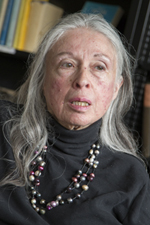Philosophy chair honored for academic contributions
Professor and Chair of Philosophy Anita Silvers, together with Eva Kittay of Stony Brook University, has been named an inaugural recipient of the Martin R. Lebowitz and Eve Lewellis Lebowitz Prizes for Philosophical Achievement and Contribution.

Professor and Chair of Philosophy Anita Silvers.
The award is given by the Phi Beta Kappa Society in conjunction with the American Philosophical Association (APA) and recognizes both scholars' celebrated work in the field of disability studies. Kittay is a distinguished professor at Stony Brook University in New York.
Both Silvers and Kittay will present their work highlighting contrasting views on justice for people with disabilities during the APA's December meeting in Baltimore. The prizes come with a $10,000 honorarium for each recipient.
"I was stunned to receive this honor, especially knowing I was competing with wonderful philosophers from top doctoral departments," Silvers said.
In addition to their mutual academic interest, Silvers and Kittay share an alma mater: Both attended Sarah Lawrence College in the 1960s, though not at the same time. They are among the first scholars to examine disability from a philosophical perspective. In 2002, they co-directed a National Endowment for the Humanities Summer Seminar on disability and justice.
Silvers and Kittay's December lectures will highlight their different viewpoints on justice, which have been influenced by their respective life experiences. As the mother of a child with profound physical and mental disabilities, Kittay argues that caring for dependent individuals such as elderly and disabled people sets humans apart from other species, and a just society should therefore emphasize the role of caregivers. Silvers, severely disabled by polio since childhood, is uneasy about viewing elderly and disabled individuals primarily in terms of dependency, and argues instead that society should include a broader range of roles for people of different ability levels.
"Unlike in other disciplines, philosophy has no separate subfield of disability studies," Silvers said. "Instead, it brings the perspectives and challenges of disability to bear on the concerns of core fields such as justice theory, metaphysics and epistemology, and feminist theory."
For example, she said, before some of the leading philosophers began to think about issues of disability, "justice was presumed to be about what normal people were owed, and anyone else was ignored by the prevailing theories of justice. Now, even senior scholars do not base their ideas of justice only on what is right for normal people. The starting point for the entire field has shifted."
Silvers is recognized as a national leader on the topics of justice and disability, and much of her more than four-decade-long career has been spent fighting to ensure equal access for all to higher education and other institutions. Her papers and books have contributed to the legal interpretation of the Americans with Disabilities Act, and her groundbreaking monograph, "Disability. Difference. Discrimination: Formal Justice," is widely cited in legal affairs. In the book "Medicine and Social Justice," recently updated and re-released and for which Silvers served as an editor, she contributed an essay exploring deficiencies in health care for the chronically ill and disabled and how to improve it.
A member of SF State's faculty since 1967, Silvers organized a statewide campaign during the 1970s that prompted California State University compliance with new federal disability access laws. She has served on dozens of academic and professional committees, including the National Council on the Humanities, the San Francisco General Hospital Ethics Committee and as a consultant to the New Zealand Human Rights Commission. In 2009, Silvers was awarded the APA's Quinn Prize for Contributions to Philosophy.